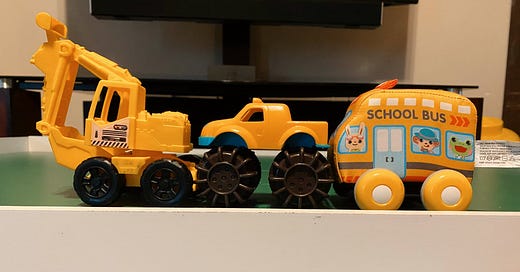This was originally published on my blog. After publishing I decided I’d rather share these stories somewhere more intimate. So I’m moving this piece as the first in a growing collection of stories at the intersection of identity, neurodivergence, and creativity.
You can read the video’s text below. Transcription is funded by paid subscribers.
TRANSCRIPT
This year we've learned something new about our family.
This video is a celebration.
Here's some context: I am autistic. I wasn't diagnosed until I was an adult, but the diagnosis suddenly explained my whole life. Growing up, I didn't talk much and I had trouble making friends my own age. Adults outside of my family often criticized me as too sensitive or too shy. I believed all of these things were character flaws.
Knowing that I was autistic changed everything. I'm working hard to reframe these perceived flaws as neurological differences. My nervous system is just processing life differently. Since becoming a parent, I've noticed that most adults are scared to attach a diagnosis of autism or ADHD to a child.
Growing up without a diagnosis. We still know we're different, and we think it's our fault. Even with the family who supported me, the wider world was not set up to support my needs, and I was often looked on with judgment.
The most important thing you can do for a neurodivergent child is to validate their experience. They may need extra supports. And that's nothing to feel shame or embarrassment about.
Around Davy's second birthday, I started seeing signs of neurodivergence. By 33 months I was confident in booking an evaluation. And this March he was officially diagnosed as autistic.
This is a celebration.
We love David's whole autistic self, and we've learned something new about him and how his brain works.
Autism has been medicalized, which means the conversation often centers on struggles and not strengths. But there are many positive autistic traits. David is an early reader, excels at puzzles, memorization, and is self motivated with a strong internal curiosity.
I do want to acknowledge that diagnosis is not equally accessible. But it was important for us. Doctors and therapists and Davy’s life were quick to dismiss any possibility of autism because he's charming, and sometimes he makes eye contact. These professionals were often educated with outdated research. There's an increased awareness of autism, but still plenty of misinformation floating around.
We drove five hours for Davy's evaluation, because it was important for me that the professional evaluating him was up to date on the newest research and saw autism as a difference and not a defect. That weekend was magical. We packed the car and snacks and sensory fidgets and toys, all the new. I found car friendly activities that matched his special interests: vehicle stickers and dinosaur magnets were a big hit. For a kid who loves to go and has been quarantined for almost two years he was living his best life.
We booked a family friendly Airbnb. It had an indoor swing, a kids play kitchen and plenty of space to run around. After being stuck in the car for a whole day we put on his favorite TV shows to help him regulate into a new space and brought along familiar foods. The next day, we ordered breakfast from the diner downstairs and drove over to the psychologist.
Their space was perfect for autistic kids. The overhead lighting was covered with cloudy sky diffusers. The waiting room was filled with sensory toys and many of Davy's favorites. There were several tests including the ADOS, which is very interactive, as well as parent interviews and lots and lots of paperwork. Before we left, the psychologists confirmed that Davy is indeed autistic. It would take a few weeks for the official paperwork, but the validation was immediate.
We celebrated with Davy's first trip to the zoo, which for an autistic kid who loves animals was an absolute delight. This was a very intentional choice after being closed in the small room for most of the day. The next morning, we took him to the park to run off some more energy before another long car ride. Since then, we've had productive conversations with his school and speech therapist about autistic differences and how we can best support him.
One of the supports Davy needs is an AAC or augmentative and alternative communication device. We call it his talker. His spoken language is delayed so David uses his talker to tap words or phrases that he wants to say. His spoken language continues to develop at his own pace. Meanwhile, this device acts as his voice.
David's diagnosis has also changed how I view my own autistic identity. Even after my diagnosis I continued to contort myself to fit within neurotypical expectations. I never asked for accommodations. I would push beyond my capacity and pay the price. Now that I know David is also autistic, I realized this would set a very unhealthy example. Instead, I am learning to express my needs, set boundaries, and ask for supports. I want to model self advocacy without shame or apology.
My generation of autistic adults grew up masking our differences. I hope David's generation can live as their authentic selves.
If you'd like to learn more about autism, I've linked some resources here.





Share this post